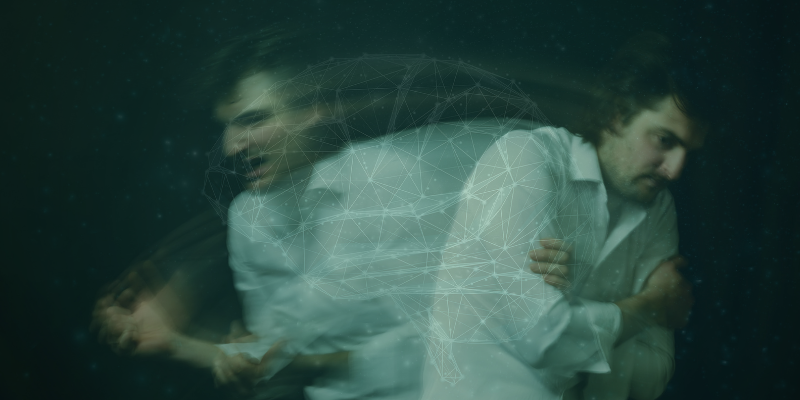
When you think of memory loss, you probably think about elderly people in nursing homes with Alzheimer’s disease. But forgetfulness can affect younger people too. It’s not uncommon for people in their 30s or 40s to start feeling the effects of faulty memory.
That’s what brought actress Jennie Garth to Amen Clinics.
Jennie is the co-host of a podcast about Beverly Hills 90210, the wildly popular 1990s TV show she starred in with her podcast co-host Tori Spelling, as well as Jason Priestley, Shannen Doherty, and the late Luke Perry. The 90210MG podcast has earned a healthy following, but it has brought to light an uncomfortable truth for Jennie: “My best friend who’s doing it with me can remember everything, and I can’t remember anything. And it’s really frustrating, and it’s upsetting to me.”
Throughout her long career, the actress has had to memorize thousands of scripts, which requires an excellent recall. But like many of the younger or middle-aged people who come to Amen Clinics for memory issues, Jennie says, “I feel like my short-term memory has taken over for my long-term memory.”
“I can’t remember anything. And it’s really frustrating, and it’s upsetting to me.”—Jennie Garth, actress, and 90210MG podcast co-host, who visited Amen Clinics for a brain scan to learn what’s causing her memory problems. Click To TweetWHAT JENNIE GARTH’S BRAIN SCANS REVEAL
To address her concerns about her memory, Jennie had brain SPECT imaging studies at Amen Clinics, the global leader in brain health. As a way to help others who might be experiencing forgetfulness, the actress shared a video of her scan experience and evaluation with Daniel G. Amen, MD, the founder of Amen Clinics and 12-time New York Times bestselling author.
SPECT is a technology that measures blood flow and activity in the brain that shows 3 things:
- Areas in the brain with healthy activity
- Areas in the brain with too little activity
- Areas in the brain with too much activity
Jennie underwent 2 SPECT studies, including a surface scan that shows blood flow, and an active scan that reveals activity levels throughout the brain. Here surface scan looked “beautiful” according to Dr. Amen, but it did show evidence of a possible head injury (perhaps from a past accident or fall?) and slightly lower blood flow near the hippocampus (an important region involved in memory).
The actress’s active scan, however, revealed a very busy brain with too much activity in areas such as the basal ganglia (a region associated with anxiety).
What does all of this mean in terms of memory?
CAUSES OF MEMORY LOSS IN YOUNGER PEOPLE
As Dr. Amen explained in his evaluation with Jennie, some things that can cause memory problems and brain fog regardless of a person’s age. Here are some of the most common.
- Long-term chronic stress: Being overly stressed actually shrinks the hippocampus. In the healthy brain, 700 new nerve cells are created every day in the hippocampus, which is critical for memory formation. But being bombarded by stress can disrupt neurogenesis (the process of new cell growth), so you don’t make as many new nerve cells as you should.
- Overactive basal ganglia: When this area of the brain works too hard, it is associated with anxiety and frequently feeling tense or keyed up. When emotional circuits are heightened, it can interfere with the formation of long-term memories.
- Head injuries: Experiencing one or more traumatic brain injuries—with or without loss of consciousness—is a major cause of memory problems in younger people. Some of the most common causes of concussions and other types of head trauma include falls (off a ladder or a bike), playing contact sports, repeatedly hitting your head (such as heading soccer balls), getting into a motor vehicle accident, violent attacks, or explosive blasts.
- Hormonal imbalances: If you’ve suffered a head injury, be sure to have a physician check your hormone levels, including thyroid, estrogen, progesterone, testosterone, and DHEA. Head trauma often damages the pituitary gland, which regulates hormone production. Hormonal imbalances are associated with memory problems in younger people.
SOLUTIONS FOR EARLY MEMORY PROBLEMS
In younger people who are experiencing brain for or memory issues, the following strategies may help.
- Practice stress-management techniques: Meditation, prayer, exercise, and deep breathing strategies can help alleviate chronic stress.
- Calm the brain: Nutritional supplements, such as 5-HTP, and saffron, can help calm a busy brain.
- Heal traumatic brain injuries: Hyperbaric oxygen therapy (HBOT) can speed the healing process in areas that have been damaged by past head trauma.
- Balancing hormones: Checking your hormone levels and optimizing them if they are off can be beneficial for recall.
Memory loss, chronic stress, anxiety, and other mental health issues can’t wait. During these uncertain times, your mental well-being is more important than ever and waiting until life gets back to “normal” is likely to make your relationships and symptoms worsen over time.
At Amen Clinics, we’re here for you. We offer in-clinic brain scanning and appointments, as well as mental telehealth, remote clinical evaluations, and video therapy for adults, children, and couples. Find out more by speaking to a specialist today at 888-288-9834 or visit our contact page here.





It is good that this actress can receive help; however, many people can’t afford the help even if we have the same symptoms as she does.
Comment by Margaret — December 30, 2020 @ 9:14 AM
I completed your brain health assessment but there is no area in which to add my email address to receive the results. I could not get to a new page . It stayed on the last page of the assessment. How do I receive results of the assessment ? Does the assessment remain in your system or , because I cannot locate the area to tell you where to send the assessment results, does it just disappear into cyberspace ??
Comment by Beth Gerhard-Burnham — December 30, 2020 @ 9:17 AM
Hello Beth, please contact our support team here: https://brainmd.com/contact
Comment by Stephanie Villafuerte — December 30, 2020 @ 10:31 AM
I agree that your clinic is not available to all. I’m in New Zealand and fear that your testing and treatment methods will arrive here way too late for me. Are you sharing your innovations with colleagues worldwide and what do you recommend to those who can’t access your clinics?
Comment by Deborah — December 30, 2020 @ 11:38 AM
I agree with Margaret that it’s great that Jennie Garth was able to have these scans done, however, she’s right in that the average person cannot afford this kind of treatment especially as none of this is covered by regular medical insurance. Plus the average single parent has no extra time or money and is living in a constant state of juggling things and anxiety just hoping and praying something doesn’t drop/fall. This shouldn’t be something only available to those with a large amount of disposable income. COVID-19 has disproportionately impacted single women as they are bearing the brunt of virtual school and either paying for increased daycare (if available) or decreasing their working hours due to having to have their children at home. What are they supposed to do? And our federal and state governments have not helped at all. I think it would be a valuable gesture for the Amen Clinic to create a Give Back program whereby those who are struggling (such as single parents) could be sponsored in order to participate in these valuable screening services. Thank you, Ellen
Comment by Ellen Whalley — December 30, 2020 @ 12:00 PM
Very interesting,I have read many of your books, am reading End Mental Health, love the light!
Comment by Kathleen — December 30, 2020 @ 1:22 PM
It’s a pity there is not have an office here in New Zealand.
We could definitely use your services!
Comment by Dallena — December 30, 2020 @ 3:34 PM
I agree with cost factor being impossible for average people. I’ve been living with identical issues as Jennie Garth and following Dr. Amen for years…but cannot afford the testing. If you are truly trying to help people, then making these tests affordable to all would be the right thing to do. I notice that these type concerns get no response by your team as well. Very disappointing Dr. Amen.
Comment by Kim — December 31, 2020 @ 5:20 AM
I believe that Dr. Amen and his wife Tana truly care about people, and I have been very satisfied with the supplements I have ordered. I don’t know what kind of red tape would be required for brain scans and care provided by Amen Clinics to be covered by health insurance, and I am afraid that if health insurance covered this type of care, then the care received would be different and watered down from what is being offered now. However, without health insurance, this type of care is not feasible for people without the extra disposable income that is necessary to pay for it. Is there any type of insurance for patients wishing to receive more holistic types of care such as scans done by Amen Clinics, functional medicine doctors, and other naturopathic types of practitioners? Thank you for any insight!
Comment by Robin Bennett — December 31, 2020 @ 5:25 AM
Do you have a clinic in South Africa?
Comment by Lynette Emery — December 31, 2020 @ 12:52 PM
I empathize with affordability and locations. We found online: self assessments, very helpful books, a podcast, videos, and a Brain Health Coach list of people all over who are knowledgeable in helping without a brain scan. A lot of issues can be identifiable by commonalities with those who had scans. Plus they do have scan payment help from donors that hopefully many can qualify for. We did the assessments, got the books, and our brains and health have most definitely improved. Doing what the doctor says in conjunction with keeping our PCP in the loop was a huge first step cause we cannot afford the test either. I do remember Dr. Amen saying they’re trying to get SPECT ins approved. Pray for that, and ourselves. Thanks for posting this, we’re curious to follow Jennie’s journey.
Comment by KL — January 1, 2021 @ 2:08 AM
Thank you for the comments by KL, January 1st.
Another thought for those who don’t have insurance… there are cost sharing organizations, one is Medi-Share, I forget the names of others. They are not insurance companies. A member is technically uninsured, but the member base helps each other to pay for medical costs. I know of some people that have a membership, and they speak highly of the services. The folks who have this type of medical financial assistance could possibly use it for the costs involved in a brain scan, but I’m not positive.
Just a thought… might be worth looking into. It is also a viable alternative to the Obamacare insurance requirements. (Which doesn’t have a penalty anymore but with the new administration that may change.)
Comment by JK — January 7, 2021 @ 5:51 PM
PS I also don’t have insurance and have been trying to figure out a way to afford a scan somehow. I also don’t have the insurance alternative that I mentioned above. I’m also looking into how to apply/qualify for those services.
Comment by JK — January 7, 2021 @ 5:59 PM